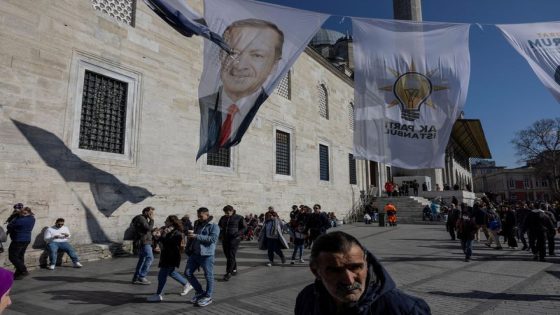ISTANBUL (Reuters) – Disunity among Turkey’s opposition parties has boosted President Tayyip Erdogan’s hopes that his AK Party can regain control of Istanbul in this month’s municipal elections, pollsters say, following his victory in last year’s presidential vote.
The outcome of the March 31 election in Istanbul, Turkey’s largest city, is seen as key in deciding the political fate of its mayor, Ekrem Imamoglu, 52, long touted as a potential leader of the main opposition CHP and possibly a future president.
Five years ago, Imamoglu and the secularist CHP dealt Erdogan a heavy blow in municipal elections by winning control of Istanbul, the president’s home city, and the capital Ankara after 25 years of rule by the AKP and its Islamist predecessors.
But Erdogan, who has dominated Turkish politics for nearly a quarter of a century, beat off a strong opposition challenge last May to win re-election as president, while the AKP and its allies secured another parliamentary majority.
The alliance that helped propel Imamoglu to victory in Istanbul has since collapsed, and his nationalist and pro-Kurdish allies are fielding their own candidates this month.
Recent polls point to a close race, with pollsters MAK this week showing 41.5% support for Imamoglu, just 1.5 points ahead of AKP candidate Murat Kurum. According to pollster Murat Gezici, Kurum had 44.1% support, ahead of Imamoglu’s 43.5%.
“The race is neck-and-neck, on a knife edge,” Ozer Sencar, chairman of pollsters Metropoll, told Reuters, emphasising the importance of Istanbul for future national politics.
“If Ekrem Imamoglu wins the election in Istanbul and this election is not cancelled by objections in some way, he will become the president (of Turkey) in 2028,” he said.
FRAGMENTED OPPOSITION
But Imamoglu’s hopes in Istanbul have been dented by the decision of the pro-Kurdish DEM Party and the Turkish nationalist IYI Party, whose voters supported him in 2019, to field their own candidates.
“The damage that the IYI and DEM parties will do to Ekrem Imamoglu must be taken seriously,” Sencar said.
Metropoll’s latest survey showed support for Imamoglu among Kurdish voters had declined to 32% last month from 35% in January. Support among IYI party voters fell to 45% from 64%.
Discord within the CHP itself, which elected a new leader this year, has added to Imamoglu’s challenge, with many in the party unhappy with the choice of election candidates.
“The biggest risk for the opposition in Istanbul is that it is becoming more fragmented than ever,” said Ertan Aksoy, head of Aksoy Research, whose survey conducted 40 days ago showed Imamoglu to be 3-4 percentage points ahead of his AKP rival.
Imamoglu has accused central government of hampering his delivery of services in Istanbul since 2019. Campaigning is now focused on solving traffic problems in a city of 16 million and the need for urban transformation, given earthquake risks in the region.
In election campaigning, Erdogan has made the opposition’s difficulties the focus of his speeches.
“No change has been able to cure the political exhaustion of the CHP. Everyone who comes and goes just makes things worse,” he told a rally this week.
(Additional reporting by Canan Sevgili; Writing by Daren Butler; Editing by Gareth Jones)
Source Agencies



